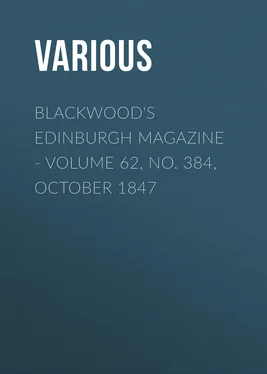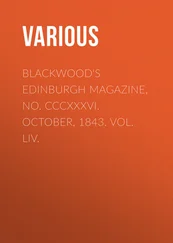Various - Blackwood's Edinburgh Magazine - Volume 62, No. 384, October 1847
Здесь есть возможность читать онлайн «Various - Blackwood's Edinburgh Magazine - Volume 62, No. 384, October 1847» — ознакомительный отрывок электронной книги совершенно бесплатно, а после прочтения отрывка купить полную версию. В некоторых случаях можно слушать аудио, скачать через торрент в формате fb2 и присутствует краткое содержание. Издательство: Иностранный паблик, Жанр: foreign_antique, periodic, foreign_edu, на английском языке. Описание произведения, (предисловие) а так же отзывы посетителей доступны на портале библиотеки ЛибКат.
- Название:Blackwood's Edinburgh Magazine - Volume 62, No. 384, October 1847
- Автор:
- Издательство:Иностранный паблик
- Жанр:
- Год:неизвестен
- ISBN:нет данных
- Рейтинг книги:5 / 5. Голосов: 1
-
Избранное:Добавить в избранное
- Отзывы:
-
Ваша оценка:
- 100
- 1
- 2
- 3
- 4
- 5
Blackwood's Edinburgh Magazine - Volume 62, No. 384, October 1847: краткое содержание, описание и аннотация
Предлагаем к чтению аннотацию, описание, краткое содержание или предисловие (зависит от того, что написал сам автор книги «Blackwood's Edinburgh Magazine - Volume 62, No. 384, October 1847»). Если вы не нашли необходимую информацию о книге — напишите в комментариях, мы постараемся отыскать её.
Blackwood's Edinburgh Magazine - Volume 62, No. 384, October 1847 — читать онлайн ознакомительный отрывок
Ниже представлен текст книги, разбитый по страницам. Система сохранения места последней прочитанной страницы, позволяет с удобством читать онлайн бесплатно книгу «Blackwood's Edinburgh Magazine - Volume 62, No. 384, October 1847», без необходимости каждый раз заново искать на чём Вы остановились. Поставьте закладку, и сможете в любой момент перейти на страницу, на которой закончили чтение.
Интервал:
Закладка:
Sadder trash than this it were almost impossible to write. It is necessary to make some quotations to justify the terms of censure, as well as of praise, which we have bestowed upon Andersen; but our readers will willingly excuse the infliction of many such quotations; they might be made abundantly enough, we can assure them.
On awaking from this vision, Antonio finds himself in the presence of some worthy monks. They take charge of him, and ultimately give him over to the protection of an old woman, a relative, Dominica, who is living the most solitary life imaginable, in one of the tombs of the Campagna. Here there is a striking picture presented to the imagination—of the old woman and the little boy, shut up in the ruined tomb, in the almost tropical heat, or the heavy rains, that visit the Campagna. He who erewhile had visions of vestals and captive Jews, Cæsar and the gladiators, is more naturally represented as amusing himself by floating sticks and reeds upon the little canal dug to carry the water from their dwelling;—"they were his boats which were to sail to Rome."
One day a young nobleman, pursued by an enraged buffalo, takes refuge in this tomb, and thus becomes acquainted with Antonio. He is a member of the Borghese family, and proves to be the very nobleman whose carriage had accidentally occasioned the death of his mother. Antonio becomes the protégé of the Borghese, returns to Rome, receives an education, and is raised into the high and cultivated ranks of society. He is put under the learned discipline of Habbas Dahdah—an excellent name, we confess, for a fool—in whose person, we presume, he takes a sly revenge upon his late rector of Slagelse. But he has not been fortunate in the invention of parallel absurdities in his Italian pedagogue to those which he may have remembered of some German prototype. He describes him as animated with a sort of insane aversion to the poet Dante, whom he decries on every occasion in order to exalt Petrarch. A Habbas Dahdah would be much more more likely to feign an excessive admiration for the idol and glory of Italy. However, his pupil stealthily procures a Dante; reads him, of course dreams of him; in short, there is an intolerable farago about the great poet.
But the time now comes when the great business of all novels—love—is brought upon the scene. And here we have an observation to make which we think may be deserving of attention.
Antonio, the Improvisatore, is made, in the novel, to love in the strangest fashion imaginable. He loves and he does not love; he never knows himself, nor the reader either, whether, or with whom, to pronounce him in love. Annunciata, the first object of this uncertain passion, behaves herself, it must be confessed, in a very extraordinary manner. We suppose the exigencies of the novel must excuse her; it was necessary that her lover should be plunged in despair, and therefore she could not be permitted to behave as any other woman would have done in the same circumstances. She has a real affection for Antonio; yet at the critical moment—the last moment he will be able to learn the truth, the last time he will see her unless her response be favourable—she behaves in such a manner as to lead him inevitably to the conclusion that his rival is preferred to him. This Annunciata, the most celebrated singer of her day, loses her voice, loses her beauty,—a fever deprives her of both;—and not till her death does Antonio learn that he, and not another, was the person really beloved. Meanwhile, in his travels, Antonio meets with a blind girl, whom he does or does not love, on whom at least he poetises, and whose forehead, because she was blind , he had kissed. He is afterwards introduced, at Venice, to a young lady, (Maria) who bears a striking resemblance to this blind girl. She is, in fact, the same person, restored to sight, though he is not aware of it. Maria loves the Improvisatore; he says, he believes that his affection is not love. He quits Venice—he returns—he is ill. Then follows one of those miserable scenes which novelists will inflict upon us—of dream, or delirium—what you will,—and, in this state, he fancies Maria is dead; he finds then that he really loved; and, in his sleep or trance, he expresses aloud his affection. His declaration is overheard by Maria and her sister, who are watching over his couch. He wakes, and Maria is there, alive before him. In his sleep he has become aware of the true condition of his own heart; nay, he has leapt the Rubicon,—he has declared it. He becomes a married man.
Now, in the confused and contradictory account of Antonio's passion, we see a truth which the author drew from his own nature and experience,—a truth which, if he had fully appreciated, or had manfully adhered to, would have enabled him to draw a striking, consistent, and original portrait. In such natures as Andersen's, there is often found a modesty more than a woman's, combined with a vivid feeling of beauty, and a yearning for affection. Modesty is no exclusive property of the female sex, and there may be so much of it in a youth as to be the impediment, perhaps the unconscious impediment, to all the natural outpouring of his heart. The coyness of the virgin, the suitor, by his prayers and wooing, does all he can to overcome; but here the coyness is in the suitor himself. He has to overcome it by himself, and he cannot. He hardly knows the sort of enemy he has to conquer. Every woman seems to him enclosed in a bell-glass, fine as gossamer, but he cannot break it. He feels himself drawn, but he cannot approach. His heart is yearning; yet he says to himself, no, I do not love. A looker-on calls him inconstant, uncertain, capricious. He is not so; he is bound by viewless fetters, nor does he know where to strike the chain that is coiled around him.
Such was the truth, we apprehend, such the character, that Andersen had indistinctly in view. He drew from himself, but he had not previously analysed that self. It is, therefore, not so much a false as a confused and imperfect representation that he has given, which the reader, if he thinks it worth his while, must explain and complete for himself. Perhaps, too, a fear of the ridicule which an exhibition of modesty in man might draw down from certain slender witlings, from the young gentlemen, or even the young ladies, of Copenhagen, may have, in part, deterred him from a faithful portraiture. To people of reflection, who have learned to estimate at its true value the laugh of coxcombs, and the wisdom of the so-called man of the world—the shallowest bird of passage that we know of—such a portrait would have been attractive for the genuine truth it contains. It would require, indeed, a master's hand to deal both well and honestly with it.
The descriptions of Italy which "The Improvisatore" contains are sufficiently striking and faithful to recall the scenes to those who have visited them; which is all, we believe, the best descriptions can effect. What is absolutely new to a reader cannot be described to him. If all the poets and romancers of England were to unite together in a committee of taste, they could not frame a description which would give the effect of mountainous scenery to one who had never seen a mountain. The utmost the describer call do, in all such cases, is to liken the scene to something already familiar to the reader's imagination. Though generally faithful, we cannot say that our author never sacrifices accuracy of detail to the demands of the novelist, never sacrifices the actual to the ideal. For instance, his account of the Miserere in the Sistine Chapel, is rather what one is willing to anticipate it might be, than what a traveller really finds it. To be sure, he has a right to place his hero of the novel where he pleases in the chapel, relieve him from the crowd, and give him all the advantages of position: still his perfect enjoyment of all that both the arts of painting and music can afford, and that overpowering sentiment which he finds in the great picture of the Last Judgment by Michel Angelo, (a picture which addresses itself far more to the artist than the poet,) strikes us as a description more from imagination than experience.
Читать дальшеИнтервал:
Закладка:
Похожие книги на «Blackwood's Edinburgh Magazine - Volume 62, No. 384, October 1847»
Представляем Вашему вниманию похожие книги на «Blackwood's Edinburgh Magazine - Volume 62, No. 384, October 1847» списком для выбора. Мы отобрали схожую по названию и смыслу литературу в надежде предоставить читателям больше вариантов отыскать новые, интересные, ещё непрочитанные произведения.
Обсуждение, отзывы о книге «Blackwood's Edinburgh Magazine - Volume 62, No. 384, October 1847» и просто собственные мнения читателей. Оставьте ваши комментарии, напишите, что Вы думаете о произведении, его смысле или главных героях. Укажите что конкретно понравилось, а что нет, и почему Вы так считаете.












